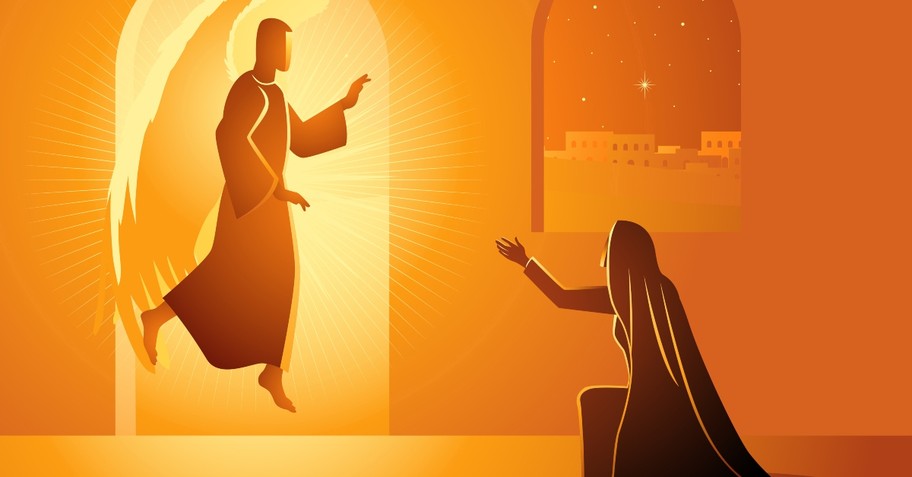Why Did God Choose Mary to Give Birth to Jesus?

God chose Mary for what might be called the most important job in world history—bringing the Messiah into the world. Her life would take a sharp detour from planning her marriage to preparing for the Messiah in her womb.
Mary’s story is woven into God’s plan to send His Son to be the Savior of the world (1 John 4:14). But why Mary? Was there something unique or special about this young woman?
Photo credit: ©Getty Images/x-reflexnaja

Why Did God Choose Mary?
We can learn many facts about Mary from the message by the angel, and from her response to that message. But we can also understand why God chose Mary by looking at Old Testament prophecies and the history and circumstances surrounding her life at that time.
God wove together every detail—the people, places, and times—to usher in His plan for redemption in Christ. But He still needed a willing vessel, a surrendered servant.
In essence, God chose Mary because she was of the right lineage, she was from Nazareth, she was engaged to a man whose lineage set up a trip to Bethlehem, she was a virgin, and she was a young woman of good character. Fleshing out these insights fosters not only appreciation for Mary, but also God’s preparations for His Son’s mission.
What Were the Angel’s Words Concerning Mary?
Gabriel—one of God’s holy angels who stands in His presence—was entrusted to deliver important messages on God’s behalf. When Gabriel appeared to Mary, she was initially “greatly troubled,” but the angel shared a wonderful surprise.
Gabriel told Mary she would conceive and bear a son (Luke 1:26-33), and the baby’s name would be Jesus, which means “Savior,” from the Hebrew root meaning “the Lord is Salvation.” Gabriel said this child, the Son of God, would reign in an eternal kingdom. He would fulfill the Davidic Covenant.
Mary asked, “How will this be, since I am a virgin?” As a chaste virgin (v. 34), this was a natural question. The angel patiently explained the supernatural conception: the Holy Spirit would come upon her, or work within her, and the power of the Most High would “overshadow” or hover over her.
According to Jewish customs at the time, young girls could enter betrothal as early as age 12. Christian historians suggest Mary was 15-16 years old when Jesus was born. To further help Mary understand the coming miracle, Gabriel shared good news about Mary’s barren relative, Elizabeth. She was carrying a son “in her old age”—in her sixth month of pregnancy (Luke 1:5-25, 36). The angel asked Mary to trust God’s message about her own son, saying, “No word from God will ever fail.”
Photo credit: ©Getty Images/rudall30

How Did Mary Respond to the Angel?
Though likely not fully understanding how this supernatural conception would happen, Mary’s song of praise shows she knew about Messianic prophecies and promises (Luke 1:54-55); and Gabriel said she was going to carry the Messiah in her womb. Saying “yes” to this privilege would be an immense decision.
Mary’s response was simple yet profound: “I am the Lord’s servant. May your word to me be fulfilled.” In “‘Let It Be’: Mary’s Radical Declaration of Consent,” Karen Swallow Prior wrote that the angel offered “an invitation to Mary to give a very modern turn to a very pre-modern event: verbal consent.” In ancient Middle Eastern cultures, justice toward women was not prevalent, so this verbal consent was “quite remarkable,” Prior said.
In her response, Mary acknowledged God’s sovereignty. In her willingness to fully surrender in obedience, she cooperated with God’s plan to bring the Messiah into the world.
What Was Mary’s Lineage, and Why Is That Important?
While Joseph’s genealogy in Matthew 1:1-16 shows Jesus’ connection to the royal Davidic throne, Mary’s genealogy is spelled out in Luke 3:23-38. Her name does not appear there, but women’s names were not normally included in genealogies. Mary was the daughter of Heli, a direct descendant of Judah, and Joseph was listed as the “son” of Heli by virtue of his espousal to Mary. (Joseph’s biological father was Jacob.)
Mary was from the tribe of Judah, the line of the Messiah. Names mentioned in Mary’s lineage include David, Boaz, Judah, Jacob, and Isaac—and all the way back to Adam. Other scriptures also point to Jesus being of the tribe of Judah (Hebrews 7:14; Revelation 5:5). Mary’s son would be qualified to bear the title “Son of David” and be the righteous “Branch” in Isaiah 11:1.
Some critics suggest Mary couldn’t be from the tribe of Judah because her relative Elizabeth was from the tribe of Levi (Luke 1:5); but women were identified with their father’s tribe, not their mother’s. Elizabeth’s mother could have been from Judah, but her father was a Levite. Vice versa, Mary’s mother may have been a Levite, but her father was from the tribe of Judah.
Photo credit: ©Getty Images/Liliboas

Why Did It Matter that Mary Came from Nazareth?
Why would an unremarkable village like Nazareth make a difference in Mary’s calling? To be from Nazareth was to invite disdain. Jews considered Nazareth unclean because the Romans kept a garrison there.
Jesus’ disciple Nathanael initially mocked Jesus’ birthplace, saying, “Nazareth! Can anything good come from there?” Psalm 22:6-7 and Isaiah 53:3 describe the Messiah as being scorned, mocked, insulted, despised, and rejected—perhaps, in part, because He was called a “Nazarene.”
Sepphoris, a thriving and beautiful trade city on the Galilean plain with an influx of Greek culture, was known as “The jewel of the Galilee.” But Gabriel was sent to lowly Nazareth, Mary’s hometown—to a peasant woman in humble surroundings.
There would be nothing in Nazareth to give Jesus prestige; but from these humble beginnings, He would be able to identify with all He came to save (Luke 19:10).
What Part Did Joseph Play in God’s Choice?
One of the reasons God chose Mary was Joseph! Their engagement was instrumental in getting them to the right place at the right time. Though many young virgins were likely from King David’s line, not many would be in the little town of Bethlehem at exactly the time when Messiah would come.
When Caesar Augustus decreed that “a census should be taken of the entire Roman world,” everyone in the Roman territory returned to their ancestral homes. Being from the “house and lineage of David,” Joseph and Mary left Nazareth and traveled to Bethlehem Ephrathah, a small town southwest of Jerusalem—a place the prophet Micah foretold for the Messiah’s birth.
Because of that census, Bethlehem was overcrowded. Joseph and Mary took refuge in an animal shelter with a manger or feeding trough because there was no space left in the inn (kataluma)—likely a private home with a guest room.
One source says Jesus may have been born in northern Bethlehem in Migdol Eder, a watchtower with a space underneath used during the lambing season. This could align with Micah 4:8, and how fitting for the Lamb of God to be born where sacrificial lambs were born! Regardless of the exact spot, Joseph was instrumental in getting Mary to Bethlehem.
Photo credit: Unsplash/Marcelo Silva

Why Was It Crucial that Mary Be a Virgin?
One of the most crucial factors in God choosing Mary was her virginity. This fulfilled the prophecy of Isaiah 7:14. Matthew also noted that the fulfilment of Isaiah’s prophecy verified the Lord’s identity. Mary was espoused to be married to Joseph, but they had no sexual relations until after Jesus was born. Because Jesus had no earthly biological father, the sin nature would not be transmitted from Joseph. Jesus was born sinless.
Joseph—knowing Mary’s pregnancy would invite public disgrace—considered a quiet divorce; but an angel encouraged him not to fear marrying her, explaining that the conception was “from the Holy Spirit” (Matthew 1:19-23).
Beyond the Gospel account, Galatians 4:4 says God sent His son, “born of a woman.” Only God could perform this miracle combination—Jesus was born fully human (from Mary) and fully God (through the Spirit).
Was Mary Particularly Special?
Gabriel’s message no doubt changed young Mary. Thoughts of motherhood replaced her joyous anticipation of marriage. Her life would never be simple or quiet again. Over time, she would learn how costly her submission to God’s calling would be.
Gabriel addressed Mary as “highly favored.” This phrase comes from a Greek word meaning “much grace.” Mary was not chosen because she was holier or more pious than others, but rather, she was “graced” by God for a unique privilege. Mary understood her need for salvation. “My spirit rejoices in God my Savior,” she said (Luke 1:28). Mary gloried in God, not herself. Throughout her Magnificat, she extolled God and His Word.
In “Why Did God Choose Mary?” Dr. David Jeremiah wrote that Mary was “favored by God for a task that would finally allow each of us to be favored.” God sent the ultimate Christmas gift not just to Mary, he said, “but to all of us—and it was Mary who delivered the package.”
Mary was obedient and morally pure, and she modeled courageous faith in God. “Such qualities,” Jeremiah wrote, “are often overlooked or even belittled by society, but they equipped Mary for God’s service.”
Photo credit: ©Getty Images

What Do We Know about Mary as a Mother to Jesus?
Mary was the only human being to be present with Jesus when He was born and for His earthly death—at the cradle and the cross. Jesus grew and matured under his earthly parents’ teaching (Luke 2:52). The Bible says after her firstborn’s birth, Mary had four other sons and some daughters (Mark 6:3)—she was not a perpetual virgin. She likely helped all her children mature as good Jews as well.
We discover from Mary’s other interactions with Jesus that she was completely human and not sinless. When Jesus remained behind in the Temple at age 12, his concerned parents searched for him, and Mary learned about her son’s relationship with God. He wanted to be in His “Father’s house.”
At the wedding of Cana, Mary initially confronted her son, but then placed faith in what He told her to do. When crowds gathered against Jesus, his family—possibly even Mary—hurried to “take charge” of Him—thinking He might be “out of his mind.” Jesus reminded everyone present that those who do the will of God are His “brother and sister and mother.” Though she likely prayed for her family and others while on earth, Mary, as a sinner, could not be a mediator regarding others’ sins. Jesus is the only mediator.
At the cross, Mary felt the pain of the “sword” Simeon prophesied would pierce her soul; but she was also comforted as Jesus asked John to care for her.
Mary is mentioned the final time as she prayed with the disciples, other female believers, and Jesus’ brothers (Acts 1:13-14). There is no biblical record about when or where Mary died. Some people believe she “assumed” (was taken up) to heaven in an exalted role, but there is no scriptural evidence for this. Mary is not to be venerated (see Luke 11:27-28); but Christ-followers continue to remember her as a woman of great faith and courage.
How Does Mary Encourage Us in Our Own Lives?
Mary’s life illustrates how God can use the most lowly, the most humble, to accomplish His purposes; and we can learn from Mary’s example of trusting God and obeying Him.
But we can also learn from her sense of wonder. As God’s plan unfolded, Mary treasured all these things and pondered them in her heart (Luke 2:19, 51). As we also treasure the knowledge of God and His activity in our lives, we can renew our sense of wonder and gratitude for what He has done and is doing, and anticipate how He will fulfill His promises to us.
Mary’s joyful song of praise encourages us to magnify God from a devoted heart. Charles Spurgeon, in “Mary’s Magnificat,” wrote, “First, let us sing. Secondly, let us sing after Mary’s manner. And thirdly, let us sing with Mary’s purpose.” Whether at Christmas or any time through the year, such singing, Spurgeon said, is “sweet to the ears of God.”
Photo credit: ©Getty Images/tatyana_tomsickova
Originally published December 15, 2021.






